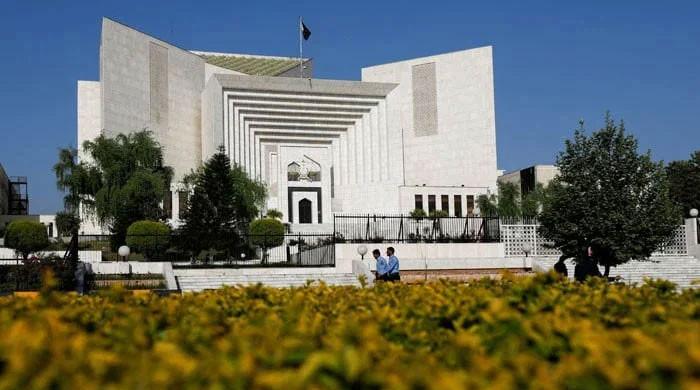- Justice Mansoor Ali Shah questions the authority of the Judiciary Committee.
- Hamid Khan defends the powers of the Practices and Procedures Committee.
- Nazar Abbas submits his reply and asks for the withdrawal of the notice.
ISLAMABAD: The Supreme Court on Thursday reserved its judgment in the contempt of court case against Additional Attorney General Nazar Abbas in the bench powers case.
A two-judge bench of the Supreme Court heard the contempt of court case against the Additional Registrar for not scheduling the right to hearing case.
The issue relates to the erroneous determination of cases – which included a challenge to the rules of the Custom Act 1969 – by Additional Registrar (Judicial) Nazar Abbas – who has been removed from his post – as erroneously determined cases meant for Supreme Court cases. constitutional bench instead of an ordinary one.
The cases were decided before a regular panel of three judges, which was heard on 13 January 2025, where, in addition to the merits of the case, the constitutionality of para. 2 in Section 11A of the Customs Act.
The court’s jurisdiction was challenged and the proceedings were subsequently adjourned until January 16.
Realizing the serious lapse on their part, the Judicial Division through a memorandum approached the General Committee under Section 2(1) of the Supreme Court (Practice and Procedure) Act 2023.
Considering the serious nature of the lapse, the committee met on January 17 under the chairmanship of the Chief Justice of Pakistan (CJP). The Committee noted that Clause 3 of Article 191A of the Constitution read with Clause 5 of Article 191A of the Constitution expressly confers such jurisdiction on the Constitutional Court and no one else.
The Committee therefore withdrew these cases from the Ordinary Bench and directed that the same should be referred to the Constitutional Bench Committee constituted under Article 191A of the Constitution for re-fixation.
The issue has also led to Justice Shah, Justice Ayesha A Malik and Justice Aqeel writing a letter to CJP Yahya Afridi, the head of the Constitution Bench, Justice Amin-ud-Din Khan on the issue regarding the formation of benches.
Today’s hearing
During the case, Justice Mansoor Ali Shah questioned whether a court order could be overturned by the judicial committee.
Amicus curiae Hamid Khan said an administrative order could not override a court order. Justice Shah further emphasized that the issue before the courts is whether the panel of judges can withdraw the case in the light of a court order and whether such a decision can be reviewed by the full court.
Justice Aqeel Abbasi noted that there seems to be confusion over the matter as the formation of benches was earlier the SC’s prerogative, but some of the court’s powers have since been curtailed, raising questions about the 26th constitutional amendment.
Justice Shah also asked whether a country allows the executive to form benches instead of the judiciary, to which Hamid replied that this does not happen anywhere.
Justice Shah said that Article 191A would allow the creation of a judicial commission for constitutional benches, and Justice Abbasi raised concerns about potential overlap in this regard.
Hamid explained that Parliament could legislate to determine the jurisdiction of courts other than the SC but could not reduce the powers of the Supreme Court.
Hamid also said the Practices and Procedures Committee has the authority to assign cases to the Constitutional Court. Justice Shah asked whether the committee could disregard a court order and referred to the Raja Amir case where a full court was set up.
Justice Shah also raised questions about the powers of the Practice and Procedure Committee under Article 2A and asked whether it could override court orders.
Hamid replied that a situation should not arise where the Practice and Procedure Committee disregards a court order.
Meanwhile, Attorney General for Pakistan Mansoor Usman Awan said that the current bench has not been properly constituted for the contempt of court case.
According to the Supreme Court Rules, the Chief Justice makes the decision on the formation of a court for contempt of court proceedings.
The Attorney General further clarified that the current bench does not have the authority to hear the contempt of court case. He explained that this case falls under the domain of civil or criminal contempt. The full procedure for contempt of court is outlined and it is within the power of the Chief Justice to oversee it.
After hearing arguments, the SC reserved its judgment in the contempt of court case, which will be announced later.
Separately, sources confirmed that the additional registrar of SC filed a reply to the show cause notice in the court, requesting its withdrawal, stating that no disobedience of the court order took place.
He clarified that the issue of bench formation was forwarded to the Practice and Procedure Committee for review.



